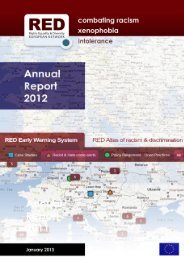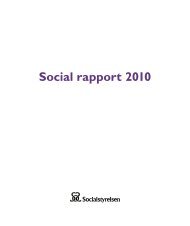R50PITFALLS AND BIAS<strong>and</strong> Educational Counseling Services (Eröss et al. 2009). The OS Hungary Test Development publishing companyis <strong>the</strong> institution responsible for test development, sales, <strong>and</strong> consultation on <strong>the</strong> use <strong>of</strong> <strong>the</strong> instruments. 15The placement <strong>of</strong> children in particular schools can at times be construed as a case <strong>of</strong> conflicting interests amongpr<strong>of</strong>essions <strong>and</strong> service providers. Educational Counseling Services operate out <strong>of</strong> particular schools, which makerecommendations for children to be tested by <strong>the</strong> Rehabilitation Committee, which in turn recommendsplacements at <strong>the</strong> schools operated by Educational Counseling Services. In <strong>the</strong>se situations, <strong>the</strong>re is a danger thatspecial schools <strong>and</strong> committees will prioritize increasing <strong>the</strong> populations <strong>of</strong> <strong>the</strong>ir respective schools over serving<strong>the</strong> best interests <strong>of</strong> <strong>the</strong> child (Csépe 2009, 163).POLICY AND PRACTICE IN ASSESSMENTAs stated in <strong>the</strong> previous section, under Decree 14/1994, §22.4, a teacher may refer a child to <strong>the</strong> EducationalCounseling Service for assessment for school readiness. Even though parental consent is required to carry out thisassessment, <strong>the</strong> quality <strong>of</strong> <strong>the</strong> consent is problematic, with parents — especially those from disadvantagedcommunities — <strong>of</strong>ten not fully aware <strong>of</strong> <strong>the</strong> long-term consequences <strong>of</strong> placement in special education (Cliffordet al. 2004, 31; Farkas et al. 2007, 220). Nagy (2008) also observes that many <strong>Romani</strong> parents are not providedinformation when asked for <strong>the</strong>ir consent to assess <strong>the</strong>ir children for <strong>and</strong> subsequently place <strong>the</strong>ir children inspecial education.Access to kindergarten for <strong>Romani</strong> children is also a concern; although children can be denied admission to schools“only due to lack <strong>of</strong> space” (Act on Public Education, Article 66.4), what this means specifically is not clearlydefined in <strong>the</strong> law. Anecdotal evidence fur<strong>the</strong>r suggests that kindergartens close to reaching capacity admit childrenfrom <strong>the</strong> ethnic majority children on a preferential basis while delaying <strong>the</strong> admission <strong>of</strong> <strong>Romani</strong> children (Farkaset al. 2007, 204). Children are also denied entry to kindergarten through <strong>the</strong> Rehabilitation Committee orEducational Counseling Service’s determination that <strong>the</strong>y are not ready to begin compulsory schooling <strong>and</strong> shoulddefer enrollment. Consequently, <strong>Romani</strong> children enter schooling later than <strong>the</strong>ir non-<strong>Romani</strong> peers; in 2000,Roma accounted for most <strong>of</strong> <strong>the</strong> 25 percent <strong>of</strong> children in kindergarten aged six or older (Clifford et al. 2004, 37).The Hungarian government has made efforts to curb <strong>the</strong> disproportionate representation <strong>of</strong> disadvantaged <strong>and</strong><strong>Romani</strong> children in special education schools <strong>and</strong> classes by distinguishing between children with organic<strong>and</strong> non-organic disabling conditions in <strong>the</strong> 2007 amendments to <strong>the</strong> Act on Public Education (Article 121.1.cc).Disabilities with organic origins include, among o<strong>the</strong>rs, physical, sensory, intellectual, or speech impairments,15 Available online: http://oshungary.hu.
R51autism, dyslexia, <strong>and</strong> dyscalculia (Article 121.1.cc.i). Although children with organic disabling conditions are entitled(under Article 52.6) to specialized rehabilitative education for a certain percentage <strong>of</strong> <strong>the</strong>ir instructional dayregardless <strong>of</strong> <strong>the</strong>ir educational placement, §14.1 <strong>of</strong> Decree 14/1994 allows for <strong>the</strong> Rehabilitation Committee todesignate schools which are largely segregated (Bohács <strong>and</strong> Tóth 2008). By way <strong>of</strong> contrast, children who haveimpaired adaptive, learning, <strong>and</strong> behavior functioning without an organic origin are entitled to developmental(remedial) education in mainstream kindergartens <strong>and</strong> schools with Educational Counseling Services (Article 30.7).Following <strong>the</strong> categorization system adapted by Csépe (2009), Nagy (2008) notes that mild intellectual disabilityis considered to be a disability with an organic origin, <strong>and</strong> that most <strong>Romani</strong> children are thus diagnosed uponassessment, such that <strong>the</strong>y enter <strong>the</strong> remedial/special education system. The remedial system <strong>of</strong> education is basedon a reduced curriculum ostensibly intended to enable pupils to catch up with <strong>the</strong> curriculum, but in practicepupils do not catch up, as <strong>the</strong>y are not ever exposed to <strong>the</strong> full curriculum. As a result, <strong>the</strong> legal possibility for(re)integration from remedial to st<strong>and</strong>ard classes is rarely actualized, with <strong>the</strong> reduced curriculum fur<strong>the</strong>r reducingpupils’ chances <strong>of</strong> passing secondary entrance exams. Moreover, remedial classes are overwhelmingly segregated(Farkas et al. 2007, 217).While <strong>the</strong> distinction between children with special educational needs (OECD Cross-National Category A) <strong>and</strong>children with adaptive, learning, <strong>and</strong> behavior difficulties (OECD Cross-National Category B) is meant to be a meansto integrate pupils into mainstream classrooms, Csépe (2008) notes that <strong>the</strong>re is no legislative provision todetermine whe<strong>the</strong>r or not <strong>the</strong> special education funding or services follows <strong>the</strong> child with a non-organic (Cross-National Category B) diagnosis to <strong>the</strong> mainstream classroom. The fact that children with non-organic impairmentsare placed in mainstream classes without any supports at all, <strong>and</strong> <strong>the</strong> absence <strong>of</strong> a clear diagnostic procedureor protocol for distinguishing between organic <strong>and</strong> non-organic conditions are also problematic. Nagy (2008)fur<strong>the</strong>r asserts that even though children with non-organic conditions should be educated in mainstream classrooms,<strong>the</strong> level <strong>of</strong> disability with which a child is diagnosed plays an important role in school placement.A 2007 amendment to <strong>the</strong> Act on Public Education, Article 126, m<strong>and</strong>ated that <strong>the</strong> Rehabilitation Committeesreassess by December 31, 2007 all pupils who had been identified as impaired “due to <strong>the</strong> disorders <strong>of</strong> psychologicaldevelopment” (a category under <strong>the</strong> law before 2007 that was subsequently abolished). The same amendmentordered that <strong>the</strong> Rehabilitation Committees refer by March 2008 all pupils determined not to have conditionswith organic origins, <strong>and</strong> <strong>the</strong>refore not eligible for special education services, to <strong>the</strong> Educational Counseling Service.While pupils in this category would still be funded <strong>and</strong> provided special educational services through August2008, <strong>the</strong> amendment m<strong>and</strong>ated <strong>the</strong> integration into mainstream classes <strong>of</strong> pupils with non-organic conditionswho were taught in separate classes (Article 126.2). Eröss <strong>and</strong> colleagues (2009) report that over 30,000 pupilswere reassessed, with one-third found not to have special educational needs <strong>of</strong> an organic nature but over half<strong>of</strong> those pupils identified as having adaptive, learning, or behavioral difficulties <strong>of</strong> a non-organic nature (Article
- Page 3 and 4: R3CONTENTSACKNOWLEDGMENTS 4EXECUTIV
- Page 5 and 6: R5EXECUTIVE SUMMARYThis policy pape
- Page 7: R7For Romani children in Central an
- Page 10 and 11: R10PITFALLS AND BIAS4. Discontinue
- Page 12 and 13: R12PITFALLS AND BIASINTRODUCTIONThe
- Page 14 and 15: R14PITFALLS AND BIASa child is read
- Page 16 and 17: R16PITFALLS AND BIASthe child (Ryan
- Page 18 and 19: R18PITFALLS AND BIASTABLE 2. Placem
- Page 20 and 21: R20PITFALLS AND BIASAMONG THE ROOTS
- Page 22 and 23: R22PITFALLS AND BIASTAXONOMY OF “
- Page 24 and 25: R24PITFALLS AND BIASdevelop the ver
- Page 26 and 27: R26PITFALLS AND BIAS2008, 136). Ard
- Page 28 and 29: R28PITFALLS AND BIASBias in test ad
- Page 30 and 31: R30PITFALLS AND BIASWhile the test
- Page 32 and 33: R32PITFALLS AND BIASOF ROMANI CHILD
- Page 34 and 35: R34PITFALLS AND BIAStwo distinct ty
- Page 36 and 37: R36PITFALLS AND BIASPOLICY AND PRAC
- Page 38 and 39: R38PITFALLS AND BIASand had to repe
- Page 40 and 41: R40PITFALLS AND BIASOrientation Tes
- Page 42 and 43: R42PITFALLS AND BIASTABLE 5. Educat
- Page 44 and 45: R44PITFALLS AND BIASCOUNTRY-SPECIFI
- Page 46 and 47: R46PITFALLS AND BIASPLACEMENT IN SP
- Page 48 and 49: R48PITFALLS AND BIASCompulsory scho
- Page 52 and 53: R52PITFALLS AND BIAS121.1.cc.ii). A
- Page 54 and 55: R54PITFALLS AND BIASTest of School
- Page 56 and 57: R56PITFALLS AND BIASof the overall
- Page 58 and 59: R58PITFALLS AND BIASAS WITH OTHER C
- Page 60 and 61: R60PITFALLS AND BIASfirst grade, or
- Page 62 and 63: R62PITFALLS AND BIASbases listed in
- Page 64 and 65: R64PITFALLS AND BIASof Societies in
- Page 66 and 67: R66PITFALLS AND BIASTABLE 13. Pupil
- Page 68 and 69: R68PITFALLS AND BIASROMANI CHILDREN
- Page 70 and 71: R70PITFALLS AND BIASdetermined to c
- Page 72 and 73: R72PITFALLS AND BIASdeveloped in th
- Page 74 and 75: R74PITFALLS AND BIASWechsler Intell
- Page 76 and 77: R76PITFALLS AND BIAStheir chances t
- Page 78 and 79: R78PITFALLS AND BIASREPRESENTATION
- Page 80 and 81: R80PITFALLS AND BIASTABLE 20.Enroll
- Page 82 and 83: R82PITFALLS AND BIAS
- Page 84 and 85: R84PITFALLS AND BIASGOOD PRACTICE A
- Page 86 and 87: R86PITFALLS AND BIASStudent assessm
- Page 88 and 89: R88PITFALLS AND BIASThe United King
- Page 90 and 91: R90PITFALLS AND BIASor assistance i
- Page 92 and 93: R92PITFALLS AND BIASTeachers report
- Page 94 and 95: R94PITFALLS AND BIASTHE DETERMINATI
- Page 96 and 97: R96PITFALLS AND BIASintellectual di
- Page 98 and 99: R98PITFALLS AND BIAS8. Ensure that
- Page 100 and 101:
R100PITFALLS AND BIASANNEX 1:RELIAB
- Page 102 and 103:
R102PITFALLS AND BIAS1. Does the te
- Page 104 and 105:
R104PITFALLS AND BIASANNEX 2:COMPON
- Page 106 and 107:
R106PITFALLS AND BIASFIGURE A4. Sam
- Page 108 and 109:
R108PITFALLS AND BIASAshton-Warner,
- Page 110 and 111:
R110PITFALLS AND BIASCahn, Claude,
- Page 112 and 113:
R112PITFALLS AND BIASD.H. and Other
- Page 114 and 115:
R114PITFALLS AND BIASFigueroa, Rich
- Page 116 and 117:
R116PITFALLS AND BIASGovernment of
- Page 118 and 119:
R118PITFALLS AND BIASHayman, Robert
- Page 120 and 121:
R120PITFALLS AND BIASKovács-Cerovi
- Page 122 and 123:
R122PITFALLS AND BIASMacura-Milovan
- Page 124 and 125:
R124PITFALLS AND BIASMoore, Tom. 20
- Page 126 and 127:
R126PITFALLS AND BIASRadivojevic, D
- Page 128 and 129:
R128PITFALLS AND BIASShepard, Lorri
- Page 130 and 131:
R130PITFALLS AND BIASTomatová, Jan
- Page 132 and 133:
R132PITFALLS AND BIASVláda Česká
- Page 134:
Copyright © 2012 Roma Education Fu




